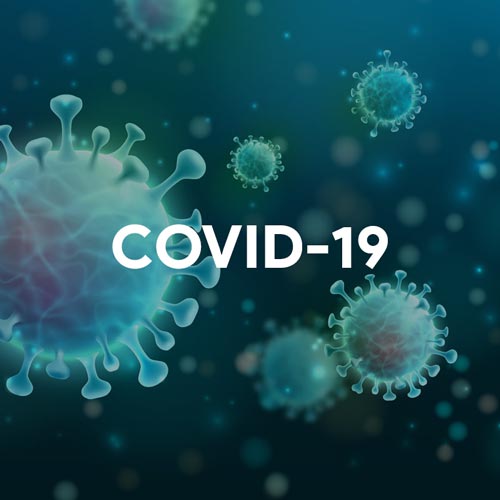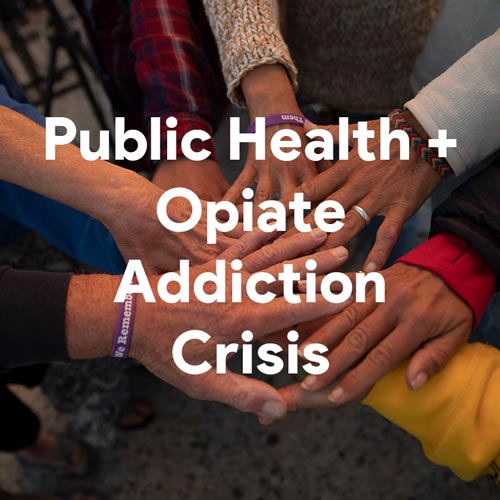COVID-19
COVID-19 Overview
COVID-19 is a new respiratory disease, caused by a novel (or new) coronavirus that has not previously been seen in humans. Reported illnesses have ranged from mild symptoms to severe illness and death for confirmed COVID-19 cases.
Symptoms of this infection may appear 2-14 days after exposure and include:
- Fever, chills or shaking chills
- Signs of a lower respiratory illness (e.g., cough, shortness of breath, lowered oxygen saturation)
- Fatigue, sore throat, headache, body aches/myalgia, or new loss of sense of taste or smell
- Other less common symptoms can include gastrointestinal symptoms (e.g. nausea, vomiting, diarrhea), rash, and inflammatory conditions such as “COVID toes”.
- In elderly, chronically ill, or debilitated individuals such as residents of a long-term care facility, symptoms of COVID-19 may be subtle such as alterations in mental status or in blood glucose control
However, it’s possible for people with COVID-19 to spread the virus to others up to 48 hours before they have symptoms. Visit the CDC’s resource on symptoms for more information.
If you develop symptoms of COVID-19, even if they are mild, or have been in close contact with a person known to have COVID-19, please contact your healthcare provider and a test site near you to schedule a test. You can also check your symptoms online.
You can also call 2-1-1 to learn more about:
- COVID-19 prevention, symptoms, and treatment
- Information about testing
- Guidance for people planning or returning from travel
For information on travel, see the CDC-issued Travel Health Notices, as well as DPH’s travel information related to COVID-19.
Variants
Variants are spreading rapidly across the globe, and they are fueling new outbreaks in the U.S., mainly among the unvaccinated. For more information on the omicron and delta variants, as well as other variants of COVID-19, visit the CDC’s website here.
Tips For Prevention
The MA DPH, CDC, and other federal, state, and local agencies are leading a comprehensive response to COVID-19. Here are some things that each of us can and should do to keep ourselves and those around us safe and healthy:
- Wash your hands, often
- Avoid close contact with other people
- Stay home if you’re sick
- Cover coughs and sneezes
- Clean and disinfect surfaces, often
- Avoid touching your eyes, nose, and mouth
COVID-19 Vaccination Information
Massachusetts is vaccinating residents of the state.
Following updated guidance from the Centers for Disease Control and Prevention (CDC), vaccines are now available for individuals 6 months and older.
COVID-19 booster shots are also available, and eligible residents are encouraged to get them. The CDC recommends that everyone ages 5 years and older receive a COVID-19 vaccine booster after completing their primary COVID-19 vaccination series. Some people can receive two boosters.
- 1st booster
- On May 20, Massachusetts officials announced that residents ages 5-11 are eligible to receive a Pfizer COVID-19 booster. The booster should be administered at least five months after completion of a primary COVID-19 vaccine series to provide continued protection against COVID-19.
- Everyone age 12 and older can get a booster after they have had their primary vaccine series:
- At least 5 months after completion of an mRNA (Pfizer or Moderna) vaccine primary series
- At least 2 months after completion of a Janssen/J&J primary dose.
- 2nd booster
- On March 29, the F.D.A. authorized a second booster dose of either the Pfizer-BioNTech or the Moderna COVID-19 vaccines under the following circumstances:
- A second booster dose of the Pfizer-BioNTech COVID-19 Vaccine or Moderna COVID-19 Vaccine may be administered to individuals 50 years of age and older at least 4 months after receipt of a first booster dose of any authorized or approved COVID-19 vaccine.
- A second booster dose of the Pfizer-BioNTech COVID-19 Vaccine may be administered to individuals 12 years of age and older with certain kinds of immunocompromise at least 4 months after receipt of a first booster dose of any authorized or approved COVID-19 vaccine. These are people who have undergone solid organ transplantation, or who are living with conditions that are considered to have an equivalent level of immunocompromise.
- A second booster dose of the Moderna COVID-19 Vaccine may be administered at least 4 months after the first booster dose of any authorized or approved COVID-19 vaccine to individuals 18 years of age and older with the same certain kinds of immunocompromise.
- On March 29, the F.D.A. authorized a second booster dose of either the Pfizer-BioNTech or the Moderna COVID-19 vaccines under the following circumstances:
Following the F.D.A.’s announcement, the C.D.C. updated its vaccine guidance to allow certain immunocompromised individuals and people over the age of 50 who received an initial booster dose at least 4 months ago to be eligible for another mRNA booster to increase their protection against severe disease from COVID-19. Additionally, adults who received a primary vaccine and booster dose of the J&J vaccine at least 4 months ago may now receive a second booster dose using an mRNA COVID-19 vaccine. You can mix and match vaccines. You do not need to get the same vaccine brand for your booster as your original COVID-19 vaccination.
Stay informed using the Administration’s website: https://www.mass.gov/covid-19-vaccine. Find additional information on pediatric vaccines at www.mass.gov/covidvaccinekids, and find more information from the CDC here. To view more information on the COVID-19 booster, including FAQs, visit this link: mass.gov/COVID19Booster.
Find the closest vaccination site to you and schedule an appointment here. If you are unable to access the website due to technological difficulties, you can call 2-1-1 to set up an appointment by phone.
COVID-19 Testing Information
You should get a test for COVID-19 if:
- You develop any symptoms of COVID-19, even if they are mild, or
- You are a close contact of someone who has tested positive for COVID-19
If you are a resident of a community at higher risk for COVID-19 spread, you are encouraged to get a COVID-19 test even if you have no symptoms. See a list of communities and learn more at www.mass.gov/StopTheSpread.
Visit Find a COVID-19 Test to search for a testing site near you.
Many sites may require pre-screening, a referral and/or an appointment. Please contact the site you plan to visit prior to arrival.
COVID-19 testing for symptomatic individuals and close contacts is usually covered by insurance and available at no cost to you. Additionally, many test sites in the Commonwealth test uninsured individuals for free. If you are uninsured, please call your local test site to confirm before making an appointment.
COVID-19 Treatment Information
More information on COVID-19 therapeutic and preventative treatments can be found at this link.
Stay Informed
Visit your town websites to learn the most recent information, local services, and guidance from our municipal officials.
- https://cohassetcovid19.com/
- https://www.hingham-ma.gov/860/COVID-19-Updates
- https://www.town.hull.ma.us/covid-19-alerts-updates
- https://www.scituatema.gov/covid-19-information
State Resources
- www.mass.gov/covid19
- 2-1-1 Hotline
Federal Resources
Health Services
Information
- Dial 2-1-1 to reach the State’s call center for information and answers to your COVID-19 questions. The service is free and multilingual.
- If you are experiencing symptoms or are concerned about exposure to COVID-19, please contact your healthcare provider, local board of health, or the Massachusetts State Epidemiology line at (617) 983-6800.
- Maintaining Emotional Health & Well-Being: https://www.mass.gov/info-details/maintaining-emotional-health-well-being-during-the-covid-19-outbreak
Insurance Coverage
- Massachusetts health insurers are required to cover the cost of testing and treatment for members who may be affected by COVID-19, including not charging copays or deductibles for those services.
- The Massachusetts Health Connector has options for enrollment outside of the Open Enrollment period.
- MassHealth announced policies to expand telehealth coverage, allow 90-day and early refills of prescriptions, make billing for COVID-19 tests easier for providers, and remind providers that there are no copays for lab tests, and pharmacies that they cannot deny medications if a member cannot pay.
- Attorney General Health Care Helpline: (888) 830-6277
Transportation
Massachusetts Bay Transportation Authority (MBTA)
- The MBTA made service changes during the height of the pandemic to match demand and help prevent the spread of COVID-19. Many services have now been restored. Schedules for the MBTA’s different modes of transit can be found below.
- Bus and Silver Line: Check your route’s schedule page.
- Subway:
- Commuter Rail: Check your route’s schedule page.
- Ferry: Check your route’s schedule page.
- The RIDE: Visit the RIDE’s website to view temporary changes to the RIDE. To cancel or reschedule a trip, call The Ride Access Center (TRAC).
- On April 19, 2022, the Massachusetts Department of Transportation (MassDOT), MBTA, and the Massachusetts Port Authority (Massport) announced updates to masking requirements following a U.S. District Court judge’s decision that voided the national mask mandate covering airplanes and other public transportation. Wearing a mask on the MBTA is now optional except for passengers on The RIDE. The MBTA continues to follow CDC guidelines encouraging people to wear face masks on public transit. Learn more about the announcement here.
Registry of Motor Vehicles
- As COVID restrictions are lifted, the RMV continues to make adjustments to better serve and safely meet the needs of customers. Keep track of those changes here: https://www.mass.gov/info-details/rmv-covid-19-information
Opportunities and Relief for Small Businesses and Employees
Small Business Resources
- The Administration has outlined many existing resources for small businesses on their website: https://www.mass.gov/info-details/covid-19-resources-and-guidance-for-businesses
- The United States Small Business Association website outlining options for PPP loan forgiveness and EIDL increases can be found here: https://www.sba.gov/funding-programs/loans/coronavirus-relief-options
Unemployment Assistance
- Unemployment Insurance (UI)
- Unemployment Insurance (UI) is the traditional unemployment benefits program for people who work for an employer and have earned at least $5,400 in the past year.
- It provides up to 39 weeks of assistance in a benefit year.
- Learn more and apply here: https://www.mass.gov/how-to/apply-for-unemployment-benefits.
- DUA has an appeal process and a waiver available for claimants who receive an overpayment of DUA benefits notice. For more information, visit the “Appealing an overpayment” and “Repayment plan” sections at this link: https://www.mass.gov/how-to/repay-unemployment-benefit-debt.
- Extended Benefits (EB), Pandemic Unemployment Assistance (PUA), and Pandemic Emergency Unemployment Assistance (PEUC)
- These benefits are no longer available.
- If you have any concerns about earned sick time, paid leave, or your rights regarding COVID-19, call the Attorney General’s Fair Labor Hotline (M-F 10am – 4pm) at 617-727-3465
Consumer Protections
Utilities
- The DPU has lifted its moratorium on electric and gas shut-offs by all private and public utility companies in alignment with the end of the declared state of emergency.
- National Grid has resumed collections activities. Get the latest updates from https://www.nationalgridus.com/COVID-19
Student Loans
- The federal government will continue to suspend loan payments, stop collections, and waive interest on ED-held student loans until August 31, 2022 (https://studentaid.gov/announcements-events/coronavirus).
- The Attorney General’s Student Loan Assistance Unit is available to help borrowers explore repayment options, including options to temporarily stop making student loan payments. Contact info: (888) 830-6277
—
LEGISLATIVE UPDATE
A comprehensive list of bills passed by the legislature in the response to COVID-19 can be found here: https://malegislature.gov/Laws/Search?searchTerms=COVID-19
![]()





